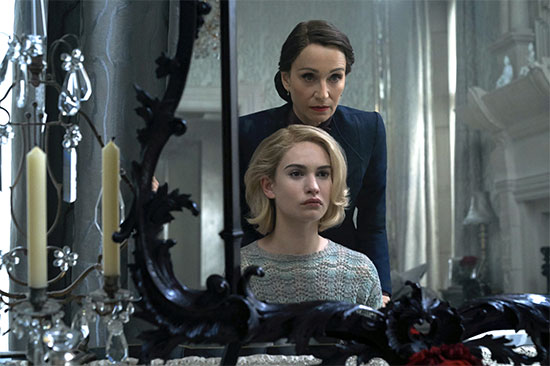“Rebecca” fails to live up to its legacy

Photo via Netflix
Netflix released its adaption of the classic Daphne du Maurier novel, “Rebecca,” on Oct. 21. The film follows a naive young woman (Lily James) who becomes acquainted with a wealthy widower, Maxim de Winter (Armie Hammer) while working in Monte Carlo. After a whirlwind two week romance, she agrees to marry him and they travel back to his acclaimed mansion, Manderley. There, she finds that she is haunted by the legacy of his late wife Rebecca, who was adored and worshiped by many, including the disapproving housekeeper, Mrs. Danvers (Kristen Scott Thomas).
When I discovered this film was coming out, I knew I had to read the novel that inspired it. Having heard of the classic before, and determining it was something I would most likely enjoy, I was ecstatic to finally read it. I discovered I was not mistaken; I quickly fell into the beautiful and haunting narrative that Daphne du Maurier created. I could easily imagine the characters, beautiful mansion and haunting undertones, so I believed that it would make an incredible movie. After reading the novel, I watched the movie and found myself utterly confused and disappointed.
This movie was faithful to the source material it was based upon, which is something I normally desire from a movie adaptation; however, I believe this was its downfall: it feels like a shallow interpretation and does not explore the implied deeper themes of the story. The movie relied too heavily on the aesthetics and the beauty of the lead actors — it strived for, and achieved, visual beauty, but lacked emotional response. The novel explores the complications of relationships and analyzes the class system, jealousy and grief. The novel is a gothic romantic thriller. None of that is reflected in the film.

The pivotal scene in both the novel and the movie is at a costume ball held at Manderley, where Mrs. de Winter is manipulated by Mrs. Danvers into wearing a costume that Rebecca wore shortly before her passing. Maxim de Winter’s reaction in both is explosive. While reading this scene in the novel, I felt horrified and embarrassed for the sake of Mrs. de Winter, but while watching the movie I just felt confusion, because the viewer had no idea why Maxim was so upset by his wife’s choice of dress. This is just one example of the movie not eliciting any sort of emotion from the audience.
In the novel, the reader is not meant to like the protagonists. Mrs. de Winter is awkward, shy and naive. Maxim de Winter is hot-headed, closed-off and secretive. The Netflix movie adaptation opts for a more bland reflection of these characters. The director tried to make them likable and unproblematic, with recognizable chemistry that was purposely absent from the novel. Kristen Scott Thomas played an incredible Mrs. Danvers; she was just the right amount of manipulative and haunting. I would argue that she was the most developed and interesting character in the film. Had the director made all of the characters have the same depth as Mrs. Danvers, I believe I’d be writing an entirely different and more positive review. Instead, the characters fell flat and made the story more muddled.
Unfortunately, I would not recommend this movie unless you just want to admire the beauty of Armie Hammer, Lily James and the aesthetics of the set for two hours. You’d be better off reading the original novel or watching Alfred Hitchcock’s award winning 1940s adaptation.

Senior Hailey Dirks is the Managing Editor and this is her second year on staff. In her free time, she loves reading, listening to music, painting and...












